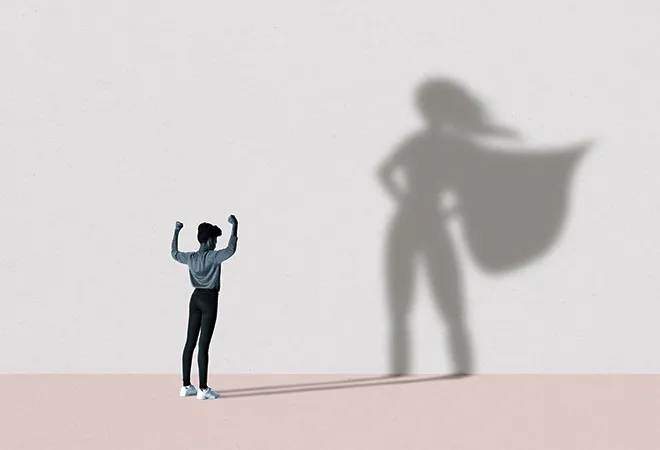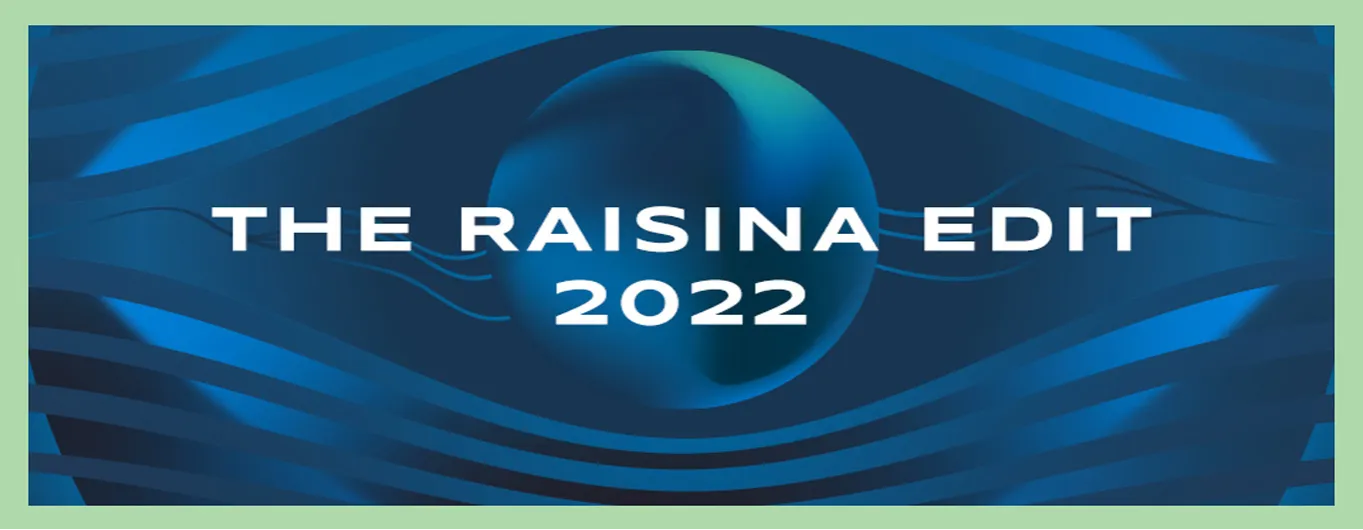 This article is part of the series—Raisina Edit 2022.
This article is part of the series—Raisina Edit 2022.
The world continues to go through turbulent times, with the COVID-19 pandemic exacerbating the existing problems of political and military insecurity, growing geopolitical rivalry, economic downturn and social inequality, climate change, and the evolving energy crisis. Notwithstanding the ongoing deliberations on the role of women, the world remains largely led by men. Research by the World Bank suggests that 2.4 billion women of working age
still lack equal economic rights. Out of the 190 countries reviewed, 178 still have legal barriers that hamper women from full-fledged participation in economic activities, and 86 countries run into some form of limitations for work. Ninety-five countries do not legally guarantee equal pay for men and women, while 76 nations have legislations that limit the rights of women over land, a major driver of overcoming poverty.
At the same time, objective data shows that including women into political and economic processes significantly ameliorates the overall outcomes. To mention a few, over the past five years while
women constituted only 14 percent of peace negotiators, female participation could decrease the risk of the peace agreement of failing by 64 percent. According to
research by the McKinsey Global Institute, the full inclusion of women into the economic process could make the world economy grow an additional US$12 trillion by 2025. McKinsey & Company data has shown that
gender diverse companies are at least 15 percent more likely to have financial returns on their activities. And women-led countries demonstrated
successful national policies in countering COVID-19 pandemic.
Out of the 190 countries reviewed, 178 still have legal barriers that hamper women from full-fledged participation in economic activities, and 86 countries run into some form of limitations for work.
At the same time, we saw that women were affected harder by the consequences of the pandemic and all efforts to achieve gender parity deteriorated. According to the
Global Gender Gap Report 2021, closing the global gender gap has increased from earlier estimates of 99.5 years to 135.6 years as a result of pandemic.
Driving Women’s Empowerment
Women empowerment and ensuring the equality of opportunities between men and women has occupied firm place at the G20 agenda. The G20—a premier forum on economic and financial governance connecting the major developed and emerging economies—“
holds strategic role in securing future global economic growth and prosperity”. While the realisation of this task remains distant, a positive outcome can be seen in the wider and more active involvement of the G20 societies in the deliberation process of various outreach processes (currently about 12), with the Women20 and Women Empower initiatives leading the way to secure women’s rights and streamlining the needed commitments into the official G20 process.
The G20 began paying closely attention to women’s empowerment issues about a decade ago, with the member countries committed to take concrete measures against barriers holding women away from
full participation in economic and social processes at the 2012 summit in Los Cabos, Mexico. The next year (2013), the G20
agreed to jointly create the “Finances for women” portal with the International Financial Corporation, in a clear acknowledgement of the importance of women’s access to financial services. In 2014, the G20 leaders agreed on the so-called
Brisbane commitments to ensure progress on reducing the gap between male and female employment by 25 percent by 2025. Initial expectations from this commitment were that over 100 million women
would enter the job market, thus expediting global economic growth and reducing poverty and inequality (although these prospects have suffered a severe setback due to COVID-19). These decisions set the stage for the Women20 initiative, which has remained one of the most active and efficient G20 dialogues.
The G20 leaders agreed on the so-called Brisbane commitments to ensure progress on reducing the gap between male and female employment by 25 percent by 2025.
Since its creation, Women20 has taken noted place within the G20 documents each year. While it is true that what little has been done is at too slow a pace, the Women20 has also greatly encouraged a global understanding of where we stand on equity and equality of opportunities for men and women—it allowed for practical exchange of best practices, highlighted weak spots in national approaches, and laid the way for higher awareness of the most urgent issues on women empowerment front.
G20 Priorities
Under the current Indonesian Presidency, the Women20 will focus on four broader issues—eradicating policy discrimination, supporting women owned- and managed- micro, small and medium enterprises (MSMEs), empowering girls and women from rural areas and those with disability, and enhancing health for gender prosperity. These themes cover the most vital issues in the effort towards equity and equality of opportunities—women entrepreneurship, financial inclusion, and labour market. The attention to social aspects of women economic participation and to the well-being of less advantageous groups showcases the importance of the global responsibility to enact the necessary measures to overcome global imbalances and its impact on women and girls.
One path forward for global development and national economies is in the realm of investing in MSMEs, particularly those owned by women. Turbulent times, such as amid the pandemic, raises the risk of MSMEs fading into darkness, while the bigger corporations are likely to receive direct support from the state in addition to having the inherent ability to manoeuvre challenges.
Investing in and supporting such businesses will have a strong economic effect and create social dividends, since women are more likely to reinvest their earnings, profits and wealth in health, education, and the wellbeing of their communities.
Such situations put women in a weaker position, since only a small share of women occupy positions in bigger companies as opposed to men. In Russia, for instance,
although women lead at least 20 percent of companies, this percentage decreases as the size of the company increases. A majority of women
hold CEO positions in Russian firms with net sales of under US$10 million, while only 6.5 percent of the country’s top 200 companies are led by women. Among MSMEs, over one-third are women-owned, about 90 percent of which are
socially-oriented businesses. Investing in and supporting such businesses will have a strong economic effect and create social dividends, since
women are more likely to reinvest their earnings, profits and wealth in health, education, and the wellbeing of their communities.
Easing the legal requirements and offering tax incentives, providing priority access to soft credit lines, and providing state-sponsored educational reskilling opportunities for women will construct a solid foundation for economic recovery in the G20 countries and beyond. While this issue is tackled with varying degree of success at the national level, the G20 could provide the necessary framework for multifaceted support for women-owned MSMEs.
The views expressed above belong to the author(s). ORF research and analyses now available on Telegram! Click here to access our curated content — blogs, longforms and interviews.



 This article is part of the series—
This article is part of the series— PREV
PREV


